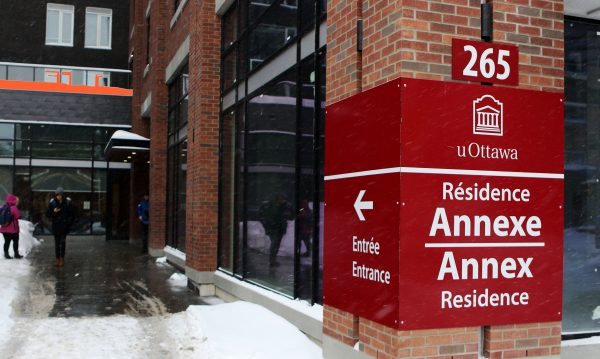Incident comes just over two weeks after university introduces new policy on proof of identification on campus
A Black University of Ottawa student says he was carded and pushed by a security guard inside his own residence building last weekend, just over two weeks after the university changed its policy surrounding proof of identification following another carding incident this summer.
Wiliston Mason, a second-year education student at the U of O who works as a community advisor (CA) in the Annex residence on Laurier Avenue, says he was returning home at around 10 p.m. on Sept. 14 when the incident took place.

Photo: Matt Gergyek/Fulcrum
Mason says he tapped his key card to enter his building but the security officer behind the desk demanded identification “to verify that you live here.” Mason says a white man entered the building moments before him, without tapping his key card, and was not stopped.
Mason explained to the Black security guard that he didn’t need to produce identification under the U of O’s updated policy and even pointed to his picture on the residence staff board behind him, but the officer persisted and grabbed for his suitcase.
“He started to push me and physically block me,” Mason says. “I kept repeating myself, making it very clear that he did not have my permission, the right or the authority to do what he was doing.”
Mason asked for the officer’s name and employee ID number but he refused to give it. Mason finally called Protection Services who let him into the building.
Mason says he has filed a police report and adds the incident left him feeling “very angry.”
The security officer in question is now banned from campus and is employed by a private firm under contract with the university, U of O media relations manager Isabelle Mailloux-Pulkinghorn said in a statement.
The “university immediately contacted the company to notify them and make sure they comply with its strict standards regarding interactions with students as per new directives implemented during the summer,” the statement reads, adding the U of O’s Office of Human Rights is in touch with Mason.
Under the interim directive to the university’s carding policy, “identification must never be requested randomly and arbitrarily and should not be Protection Services’ routine practice.” Students can also choose not to produce ID.
Ottawa Police Services confirmed they are investigating a reported assault on Sept. 14 at around 10 p.m., but would not release more information.

Photo: Parker Townes/Fulcrum
Mason says he shared his story to encourage other students with similar experiences to come forward.
“We will never know how many times (carding has) actually happened,” he says.
“You pay to come to school here, you should feel be able to feel safe on your own campus,” Mason says. “You can come forward too, it doesn’t need to be kept in the dark.”
Mason’s Sept. 14 incident follows the carding and handcuffing of Black U of O student Jamal Boyce by Protection Services on June 12, leading to allegations of racism, racial profiling and harassment and widespread condemnation from the community.
After letting them know that i didn’t have my wallet on me and trying to walk away they followed me, hit my phone to the ground as i tried to record, grabbed me and put me in handcuffs #blackoncampus @ctvottawa @uottawa pic.twitter.com/yQ7C7W2A1G
— Jamal (@Jamal_KB) June 13, 2019
In the wake of Boyce’s interaction with campus security, the U of O introduced four measures to address racism and discrimination on campus on Sept. 4, including the changes to the carding policy. Some student leaders have pointed to gaps in the measures.
Frémont said in an interview on Sept. 10 the measures are “a first step” and “a sort of patch on an immediate crisis,” and will be followed by a “medium- and long-term agenda.”
A report by former vice-chair of the Human Rights Tribunal of Ontario Esi Codjoe into the carding and handcuffing of Boyce is yet to be released.
It was announced on June 18 and will be made public within the limits of the law. Codjoe is tasked with determining whether Policy 33 and the Trespass to Property Act were properly applied in Boyce’s case and in accordance with the law and human rights.
Editor’s note (21/09/19, 10:55 a.m.): The original version of this article misstated the time Wiliston Mason returned to his residence building. It was 10 p.m., not 10 a.m.





